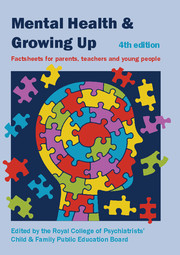Book contents
- Frontmatter
- Contents
- Contributors
- Factsheets for young people
- Factsheets for parents, carers and anyone who works with young people
- 1 Good parenting
- 2 The restless and excitable child
- 3 Dealing with tantrums
- 4 Children who soil or wet themselves
- 5 Sleep problems in childhood and adolescence
- 6 Behavioural problems and conduct disorder
- 7 Attention-deficit hyperactivity disorder (ADHD)
- 8 The child with general learning disability
- 9 Specific learning difficulties
- 10 Autism and Asperger syndrome
- 11 Depression in children
- 12 Worries and anxieties: helping children to cope
- 13 Divorce or separation of parents: the impact on children and adolescents
- 14 Death in the family: helping children to cope
- 15 The emotional cost of bullying
- 16 Traumatic stress in children
- 17 Domestic violence: its effects on children
- 18 Child abuse and neglect: the emotional effect
- 19 Drugs and alcohol: what parents need to know
- 20 Self-harm in young people
- 21 Psychosis
- 22 Schizophrenia
- 23 Bipolar disorder in children and adolescents
- 24 Obsessive–compulsive disorder in children and young people
- 25 Eating disorders in young people
- 26 Chronic physical illness: the effects on mental health
- 27 Medically unexplained physical symptoms
- 28 Chronic fatigue syndrome: helping your child get better
- 29 Parental mental illness: the problems for children
- 30 Who's who in CAMHS
2 - The restless and excitable child
from Factsheets for parents, carers and anyone who works with young people
Published online by Cambridge University Press: 02 January 2018
- Frontmatter
- Contents
- Contributors
- Factsheets for young people
- Factsheets for parents, carers and anyone who works with young people
- 1 Good parenting
- 2 The restless and excitable child
- 3 Dealing with tantrums
- 4 Children who soil or wet themselves
- 5 Sleep problems in childhood and adolescence
- 6 Behavioural problems and conduct disorder
- 7 Attention-deficit hyperactivity disorder (ADHD)
- 8 The child with general learning disability
- 9 Specific learning difficulties
- 10 Autism and Asperger syndrome
- 11 Depression in children
- 12 Worries and anxieties: helping children to cope
- 13 Divorce or separation of parents: the impact on children and adolescents
- 14 Death in the family: helping children to cope
- 15 The emotional cost of bullying
- 16 Traumatic stress in children
- 17 Domestic violence: its effects on children
- 18 Child abuse and neglect: the emotional effect
- 19 Drugs and alcohol: what parents need to know
- 20 Self-harm in young people
- 21 Psychosis
- 22 Schizophrenia
- 23 Bipolar disorder in children and adolescents
- 24 Obsessive–compulsive disorder in children and young people
- 25 Eating disorders in young people
- 26 Chronic physical illness: the effects on mental health
- 27 Medically unexplained physical symptoms
- 28 Chronic fatigue syndrome: helping your child get better
- 29 Parental mental illness: the problems for children
- 30 Who's who in CAMHS
Summary
What makes children overactive?
There are many things that can make a child overactive. The following should give you some guidance as to the reasons for your child's behaviour. Finding the reasons may help you to come up with some solutions to deal with them.
• Being a parent
If parents are unhappy, depressed or worried, they tend to pay less attention to their children. They may find they can't spend the time they need to help children play constructively, or they may find that when they do play with them, they spend a lot of time telling them to be quiet. Children learn from this that they have to be naughty or noisy to get any attention from their mum or dad.
• No clear rules
It is important to have simple rules about what is allowed and what is not. If two parents are involved, they both need to agree about the rules, and be consistent and fair when they say ‘no’. This will help the child to know what is expected and to learn selfcontrol.
• Child's temperament
We are all born with different temperaments. Some children are livelier, noisier and more outgoing than others. They may prefer going out and being with other people than quietly reading a book or playing with toys by themselves. Quite often, children who are active like this are also excitable and may go over the top while playing. Although this can be a nuisance, it is nothing to worry about, but you may need some help in finding ways to help your child calm down.
• Learning and other problems
Some children find it hard to learn things that other children find easy. They may need special help at school. They may seem quite young for their age and find it hard to concentrate on work or control their behaviour as well as other children.
• ADHD
Some children may be affected by attention-deficit hyperactivity disorder (ADHD). If this is the case, seek help.
• Hearing problems
Glue ear (ear infections) is a common example of a hearing problem. If a child has glue ear, they will find it hard to hear what other people say, will tend to shout and may want the television turned up very loudly.
- Type
- Chapter
- Information
- Mental Health and Growing UpFactsheets for Parents, Teachers and Young People, pp. 50 - 51Publisher: Royal College of PsychiatristsPrint publication year: 2013



